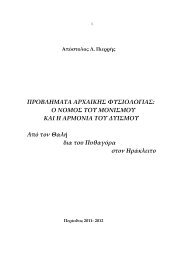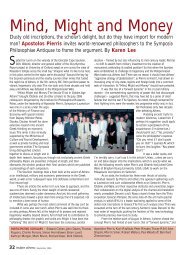chapter 10 the monism of darkness and the dualism of limit and ...
chapter 10 the monism of darkness and the dualism of limit and ...
chapter 10 the monism of darkness and the dualism of limit and ...
Create successful ePaper yourself
Turn your PDF publications into a flip-book with our unique Google optimized e-Paper software.
MONISM OF DARKNESS - DUALISM OF LIMIT AND INDETERMINACY 65<br />
some <strong>of</strong> <strong>the</strong> former ally with <strong>the</strong> latter in this titanic Fight <strong>and</strong> War.<br />
Light wins; hence it reigns supreme <strong>and</strong> governs <strong>the</strong> World, but it also<br />
reveres, <strong>and</strong> st<strong>and</strong>s in awe <strong>of</strong>, Maternal Darkness 22 , <strong>the</strong> preceding but<br />
hidden principle. Salient, integrated examples <strong>of</strong> such an articulation<br />
are <strong>the</strong> Enuma Elish (<strong>the</strong> Babylonian Epic <strong>of</strong> Creation) <strong>and</strong> <strong>the</strong><br />
Hesiodic Theogony.<br />
This basic structure varies in different places <strong>and</strong> people. The<br />
crucial point <strong>of</strong> interest is that as we approach <strong>the</strong> Iranian Zoroastrian<br />
world-model, <strong>the</strong> Struggle <strong>of</strong> Light <strong>and</strong> Darkness becomes all <strong>the</strong><br />
more intense, irreconcilable <strong>and</strong> in <strong>the</strong> end absolute as it comprises<br />
even <strong>the</strong> very first principles in its convolution (Enuma Elish). There is<br />
<strong>the</strong>n no possibility <strong>of</strong> harmonious conjugation between <strong>the</strong> contrary<br />
principles. In <strong>the</strong> Hittitic Epic <strong>of</strong> Kumarbi (<strong>and</strong> in <strong>the</strong> Song <strong>of</strong><br />
Ullikummi) recurring battles <strong>of</strong> gods are inscribed in <strong>the</strong> frame <strong>of</strong><br />
struggles for domination (as in <strong>the</strong> successions <strong>of</strong> kingship in <strong>the</strong><br />
Hesiodic Theogony), but <strong>the</strong> beginnings <strong>of</strong> things are not known 23 .<br />
The Egyptian great War, by contrast, is a struggle between two<br />
chthonic powers both potent but belonging to a more recent phase <strong>of</strong><br />
<strong>the</strong> <strong>the</strong>ogonic series: <strong>the</strong> Osirian Horus <strong>and</strong> Seth represent <strong>the</strong> two<br />
parties <strong>of</strong> Darkness, one that allies with Light in <strong>the</strong> constitution <strong>of</strong><br />
Cosmic Harmony, <strong>and</strong> ano<strong>the</strong>r that opposes it.<br />
7. The primary Greek experience coincided with <strong>the</strong> general<br />
structure described above. Darkness gives birth to Light 24 <strong>and</strong> later<br />
when her own aboriginal <strong>limit</strong>less Indeterminacy (àappleÂÈÚ›·) attains<br />
<strong>limit</strong>s through <strong>the</strong> working <strong>of</strong> her very <strong>of</strong>fspring, <strong>the</strong> universal World<br />
Order <strong>and</strong> Cosmic Harmony come into being. Primaeval Abyss’<br />
chaotic condition includes not only <strong>the</strong> principle <strong>of</strong> mobility par<br />
excellence, namely prolific fertility, but also <strong>the</strong> power <strong>of</strong> giving birth<br />
to <strong>of</strong>fspring characterized by <strong>limit</strong> <strong>and</strong> light, which <strong>limit</strong>s <strong>and</strong><br />
brightens <strong>the</strong> infinity <strong>and</strong> <strong>darkness</strong> <strong>of</strong> its progenitor. Even in <strong>the</strong> epic<br />
poem <strong>of</strong> Olympianism, <strong>the</strong> Iliad, <strong>the</strong> implicit cosmogony is one <strong>of</strong> <strong>the</strong><br />
Monism <strong>of</strong> Darkness, since it is She who is <strong>the</strong> very first principle. The<br />
Titans are children <strong>of</strong> Heaven (OéÚ·Ó›ˆÓ˜ E 898) <strong>and</strong> (those that<br />
fought with Cronos Ξ 279 against Zeus <strong>and</strong> his new order) lie in<br />
Tartarus (Ξ 279) at <strong>the</strong> world’s extremities where <strong>the</strong> roots <strong>and</strong> outer<br />
<strong>limit</strong>s, <strong>the</strong> boundaries, <strong>of</strong> Earth <strong>and</strong> Sea exist (Θ 13-16, 478-481).<br />
Among <strong>the</strong> Titans, Cronos <strong>and</strong> Iapetus are explicitly mentioned as










